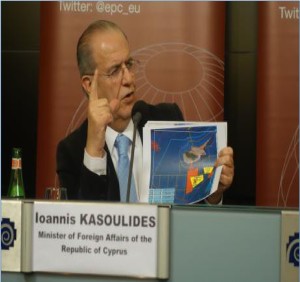 Minister of Foreign Affairs of Cypriot, Ioannis Kasoulides delivered a speech at the European Policy Center think tank, in Brussels, titled “View from a Front Line EU Member State: Cyprus and the Security and Stability of the Middle East and the Eastern Mediterranean”.
Minister of Foreign Affairs of Cypriot, Ioannis Kasoulides delivered a speech at the European Policy Center think tank, in Brussels, titled “View from a Front Line EU Member State: Cyprus and the Security and Stability of the Middle East and the Eastern Mediterranean”.
This policy briefing, served as an opportunity to discuss the fight against Islamic State (or Daesh, as it is called in Arabic) and the multiple challenges that Lebanon faces, which is a top priority of Cyprus, as a result of the spill-over from the Syrian and Iraqi crises. The volatile situation in Syria and Iraq threatens to disturb region’s social, political and economic stability.
Lebanon is a fragile target for the extremists of the area, Minister Kasoulides said, underlining the need to reinforce the military aid mission to Lebanon, as well as the efforts to support the Lebanese Armed Forces. He spoke of “certain question marks around Turkey”, namely its relations with Israel and Egypt. According to him, it is up to Turkey to decide what its relations will be vis-à-vis the countries in the region. Additionally, he asked whether the fight against Daesh was a priority for Turkey. In contrast, Kasoulides highlighted the role of Cyprus in combating international terrorism and promoting peace, prosperity and stability through consortiums and synergies across the region.
In his analysis, ISIS was created by the Syrian civil war, the international community having “largely miscalculated the Syrian crisis”. The minister said that his country’s view on resolving the Syrian conflict was to create an Iraq-type solution, without Assad and flagged up that the role of Russia and Iran are crucial in any such solution.
Minister Kasoulides referred to the Ukrainian crisis and the relations between Cyprus and Russia and expressed the point of view that Cyprus has nothing to gain from the situation in the Ukraine. He would like to see the crisis to be defused, but he mentioned that Cyprus cannot choose where to stand for (for Russia, or for Ukraine). There is no choice for them – it is not a choice of principle but a choice of a long and traditional friendship with Russia. In addition to this, several media reported that Cyprus, a member of EU and of the eurozone, but not of NATO, is offering Russia military bases. This was vehemently rejected by the country’s foreign minister Ioannis Kasoulides. Kasoulides called “rubbish” press reports about Cyprus being ready to provide air and maritime bases to Russia.“It is rubbish to talk about as I saw in publications, about ‘military bases’. The question of facilities we are talking about are facilities of purely humanitarian nature and not facilities of military nature. And they will not involve the Andreas Papandreou military airbase of Cyprus.
“There has never been and there is no question of Russian air or naval military bases on the soil of. It’s about the evacuation of Russian citizens in case of a war in the Middle East, in the same way that Cyprus has a number of agreements with other countries for the same purpose,” Kasoulides said. The minister explained that the present Cypriot agreement for military cooperation with Russia covered the procurement of spare parts and the maintenance of arms that have been purchased by Cyprus from Russia. He said an agreement is needed to continue this cooperation. He explained that this was an agreement that existed for years, that expired last December and needed renewal. Kasoulides explained that Cyprus needed such agreement with Russia because an embargo prevents his country from acquiring arms except from France or Russia.
On the aspect of the bilateral relations between Cyprus and Turkey, Foreign Minister commented on Turkey’s EU accession process and progress by predicting that Turkey won’t join EU. As regards ongoing negotiations on the reunification of Cyprus, Kasoulides said that there have been some meetings and others will follow. During these meetings, the extent of differences between the two sides is being evaluated, he added. The next stage will have to do with an effort to find convergences or to narrow the gap of existing differences, he said, adding that he expects that this will take place in April after the elections that will be held in both states. Even though, regarding Turkish-Cyprus relations, Turkey had decided for the first time to use force, sending naval vessels specializing in seismic exploration, into Cyprus’ Exclusive Economic Zone, without permission, a movement which constitutes an issue of international legality and breach of law.
